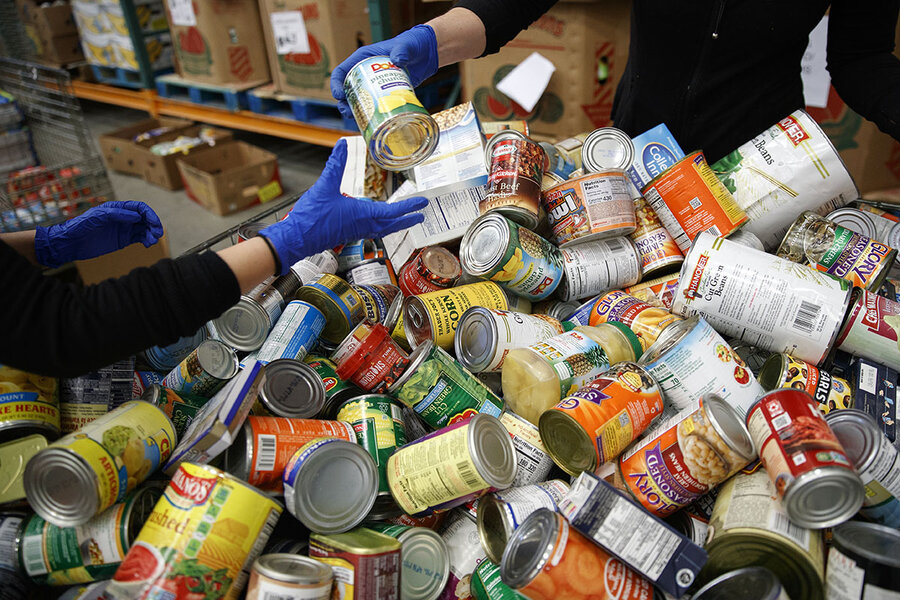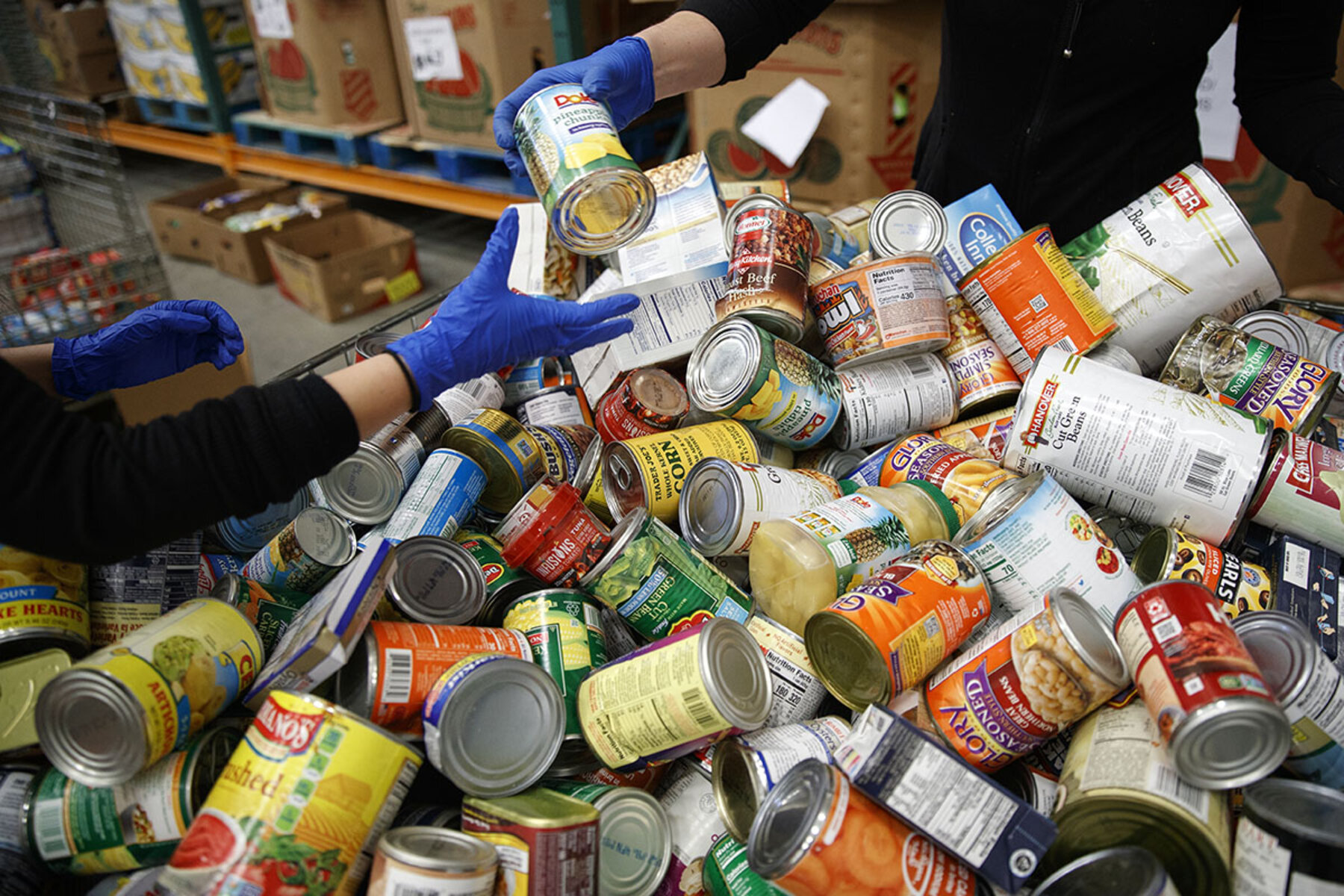
For the newly food insecure, help that preserves dignity
As job losses rose in 2020, so did the number of Americans facing food insecurity. DC Central Kitchen expanded from job training to emergency feeding.
Odessa Davis is used to helping families as a public school teacher and summer camp director in Maryland’s Montgomery County. But when the pandemic forced camps to close, the single mother realized her own family was in need. So she swallowed her pride and sought help to feed her 11-year-old son.
Ms. Davis is one of many Americans who struggled to put food on the table for the first time during the past year. As job losses skyrocketed, the number of Americans facing food insecurity reached 265 million in 2020, according to a Northwestern University .
To meet the rising demand, relief organizations had to get creative. In Washington, D.C., Capital Area Food Bank teamed up with Goodwill to distribute pre-packed boxes of food to families like Ms. Davis’.
Hilary Salmon, communications director of Capital Area Food Bank, says helping people work past the stigma of asking for help is an important step in combating hunger. “There’s nothing more important than making sure you and your family are getting your basic needs met,” says Ms. Salmon. “Our partners are deeply committed to making sure everybody who walks through their doors are treated with respect, dignity, and support.”
Episode transcript
Clay Collins: Welcome to “Rethinking the News” by ���Ǵ���. I’m Clay Collins, one of its editors. Today we’re offering a story that’s very much of the times. Our Ibrahim Onafeko takes a look at the changing face of hunger in the United States – and at a nimble organization in the Washington, D.C., area that has reinvented itself to better serve some of those who’ve had to seek out food assistance for the first time in their lives. Here’s Ibrahim’s story.
[Music]
Ibrahim Onafeko: This is Odessa Davis, a teacher in Montgomery County, Maryland. A single mother of an 11-year-old boy, she usually splits her year between teaching at a local public school and working as a summer camp director. This was before the pandemic hit, shutting the summer camp down and leaving Odessa suddenly without income, hampering her ability to provide for her family.
Ibrahim: While Odessa didn’t qualify for unemployment, she was able to receive the Pandemic Electronic Benefit Transfer (P-EBT). The P-EBT card, which is designed to replace meals lost due to the coronavirus school closures, provided Odessa with $5.70 in benefits for each school day for her son. Unable to fully meet the needs of her family, Odessa began receiving food assistance from Capital Area Food Bank last summer.
Ibrahim: Many people like Odessa have found themselves newly facing food insecurity during the pandemic. She was one of hundreds of thousands that sought food assistance last year from Capital Area Food Bank, the largest food relief organization in the Washington, D.C., area. As millions of Americans lost their jobs during the pandemic, the number of people experiencing food insecurity skyrocketed. In 2019, some 35 million people experienced food insecurity. But that number has more than doubled in 2020, according to an estimate by Northwestern University.
Historically, people often associate food insecurity with homelessness. But that’s a misperception. More often, those experiencing hunger are people like Odessa.
Ibrahim: That’s Hilary Salmon, the Communication Director of Capital Area Food Bank.
Ibrahim: For Odessa, asking for and getting the help she needed wasn’t easy. There’s a lot of stigma when it comes to asking for food assistance.
Ibrahim: For Capital Area Food Bank, helping its clients overcome this stigma is an essential part of food relief work. Here’s Hilary again.
Ibrahim: As food insecure households have risen over the last year, food relief organizations have had to be creative in finding new ways to serve their communities. DC Central Kitchen, an organization that combats hunger and poverty through job training and job creation, turned its cafe into an emergency feeding site.
Ibrahim: That’s Alexander Moore, chief development officer at DC Central Kitchen.
Ibrahim: Capital Area Food Bank – which believes in letting people come to its food bank and pick the foods they like – had to shift its approach as well. They now pack food in boxes and deliver them to people in need.
Ibrahim: That’s the president and CEO of Capital Area Food Bank, Radha Muthiah.
Ibrahim: To do this, they’ve partnered with some nonprofit organizations to help with the building and distribution of these food boxes. They’ve also created jobs for unemployed members of their community.
Ibrahim: Goodwill Industries International also pitched in.
Ibrahim: For Odessa and her son, these food boxes have been a stress reliever.
Ibrahim: While the boxes can help families, they’re not perfect. People have different dietary needs and restrictions, and delivering perishable items before they go bad can be a challenge. But most families make do with what they get.
Ibrahim: In many ways, pre-packaging food for recipients goes back to the old model of food aid distribution – just take what is given to you. Dr. Caitlin Caspi, the director of the Food Security Initiative at the University of Connecticut, says choice is an important part of the conversation.
Ibrahim: Dr. Caspi says the model of giving people the choice helps them meet their individual needs.
Ibrahim: Even as food banks adopted new strategies, they still struggled to respond to the high demand for food assistance. Their food donations dwindled, causing them to rely much more heavily on financial donations.
Ibrahim: That’s Radha Muthiah again, the president and CEO of Capital Area Food Bank.
Ibrahim: While financial support and donations continue to keep food banks running, it does raise the question: should food security rely on charity? Dr. Caspi points out that we will continue to be forced to rely on a charitable food system until we change how we approach the issue.
Ibrahim: And Alex Moore, the chief development officer at DC Central Kitchen, says we shouldn’t think about food security as being only about food: it’s also about politics.
Ibrahim: And if we want to address some of these issues, then society should look at ways to increase opportunities within communities, and allow that to be a pathway out of food insecurity. Here’s Dr. Caspi again:
Ibrahim: According to Alex, their organization takes the approach that eradicating hunger is everybody’s responsibility. And until things change at the systems level, DC Central Kitchen will continue to provide much needed support and nourishment to their recipients. Not just filling their bellies, but paving a way for their futures too.
Ibrahim: In the midst of her struggle, Odessa’s belief in living as an example for her son fills her with the strength to persevere.
Narrator: Thanks for listening. This story was reported, produced, and narrated by me, Ibrahim Onafeko. Editing by Jingnan Peng, Samantha Laine Perfas, and Clay Collins. Sound design by Tim Malone.
This story was produced by ���Ǵ���, copyright 2021.
[End]
